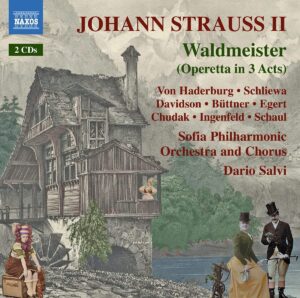Strauss II: Waldmeister
Bortolotti, Schliewa, R. Davidson, Buettner, Sofia Philharmonic Chorus and Orchestra, Salvi
Naxos 8.660489-90
Maestro Dario Salvi makes his long-awaited return to the Naxos Catalogue with the premiere recording of Strauss II’s once resounding hit Waldmeister. Admired even by the likes of Johannes Brahms, the piece inexplicably fell from favour. The oft-cited reason (almost always with operetta) is that the libretto is not equal to the music, but I think this is generally too regularly used as a crutch. Granted, the plot is overly complex, but the challenges, as this recording amply demonstrates, are far from insurmountable. However, were I to attempt a plot explanation here, it would blow the majority of the word count, so I’m going to jump straight in with a few observations of the product before us.
Of course, there is no shortage of hummable tunes in this operetta – so much so that I have found myself humming them back to myself after only a couple of listens. That said, one does get the impression with some tunes that the composer may have slightly over-used them in his efforts to structure the work coherently and make sense of the complexities of the plot. Unlike other Strauss operettas, this is very much an ensemble piece, with a few standout arias for soloists, but more notably, impressive writing for many singers, or groups of singers at a time. Challengingly, 3 of the 4 leading male roles are for tenors, so it is gratifying that we have the combined forces of Daniel Schliewa, Friedmann Buettner and Noah Schaul who rise admirably to the occasion, even if Schliewa, in his opening aria, does audibly struggle. Similarly, sopranos Annika Eger, Martina Bortolotti von Haderburg, Andrea Chudak and sole contralto Dorothe Ingenfeld navigate some truly unforgiving vocal writing with great aplomb, the whole ensemble capturing perfectly the joy of the piece. While the cast make an admirable case for the work, however, one is slightly left wondering what an ensemble of world-renowned singers might make of the work. The chorus, meanwhile, adds great texture to the piece. Even if the micing does make them sound a little distanced, this does not detract from their keenly-felt presence as superb ensemble performers.
Salvi, who again reconstructed and prepared the score and parts, handles the orchestra with his usual flair: never overly showy, but always in service to every nuance that Strauss’ score demands.
Again, Naxos provide a scant synopsis and only a German-language libretto, which continues to be irksome, especially in a plot as complex as this one. This work and its performers deserve better! This gripe aside, however, it proves a wholly enjoyable listen, which leaves one feeling charmed and energised in equal measure by this compelling argument for a long neglected work, aching to get back to our opera houses! DA

Thank you Daniel. You always write very competent reviews of my works!